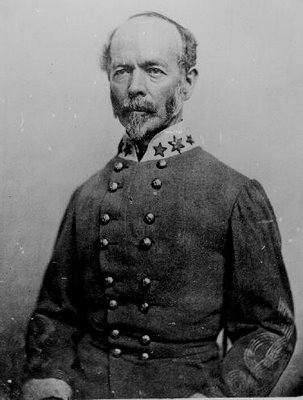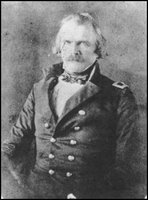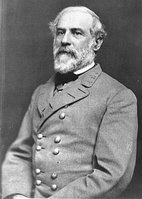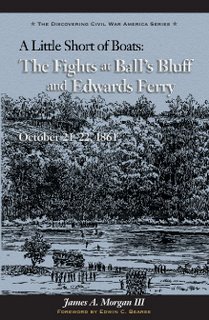 You may be wondering why I'm starting a Civil War trivia post with a picture of CNN celebri-journalist Anderson Cooper.
You may be wondering why I'm starting a Civil War trivia post with a picture of CNN celebri-journalist Anderson Cooper.
Well, as I wrap up the book "The Class of 1861"on the May and June graduates of West Point at the start of the war, I find an interesting series of genealogical ties.
 The foreword to the book, for instance, is written by George Plimpton, the author, above.
The foreword to the book, for instance, is written by George Plimpton, the author, above.
He is the great-grandson of this man: Adelbert Ames, a member of the May 1861 class, who was the last living Civil War general at the time of his death (which statement somehow is grammatically incorrect, but I can't say how).
Adelbert Ames, a member of the May 1861 class, who was the last living Civil War general at the time of his death (which statement somehow is grammatically incorrect, but I can't say how).
However, I think it likely that to today's tele-centric audience, the late Plimpton is not the most famous descendant of a member of the Class of 1861. You see, the not-so-handsome man above, Judson "Kill-Cavalry" Kilpatrick — so nicknamed for his reckless disregard for his men's lives — is the great-great-grandfather of the handsome anchorman who tops the page.
You see, the not-so-handsome man above, Judson "Kill-Cavalry" Kilpatrick — so nicknamed for his reckless disregard for his men's lives — is the great-great-grandfather of the handsome anchorman who tops the page.
Kilpatrick, who went on to serve as a minister to Chile, had twin granddaughters, one of whom became the second wife of Reginald Vanderbilt and gave birth to Gloria Vanderbilt; who is, of course, the mother of the host of CNN's "360."
(The other, by the way, was the mistress of the Prince of Wales in the early 1930s, until she made the tactical error of introducing the future Edward VIII to her friend, Wallis Simpson. That turned out about as well for all involved as Kilpatrick's cavalry charges at Gettysburg did for Brig. Gen. Elon Farnsworth.)
Aside, at the top of the May class, ahead of both Ames and Kilpatrick, was a fellow whose ancestors and descendants were among the rich and famous: Henry Algernon du Pont — of those du Ponts.
The "goat"of the May class (the last-place graduate) was a fellow named Sturgeon. He had the good sense, after the war, to retire from the cavalry sometime before the "goat" of the June 1861 class led the regiment to the Little Bighorn.
Saturday, November 29, 2008
Civil War trivia time!
Made up by Ace at 11:47:00 AM 0 rants/retorts
File under: civil war
Monday, June 02, 2008
Eloquence and envy...
My old classmate Blakeslee has a song called "Opiates and Envy," but this is probably a little different.
This is a writer's lament.
Well, assuming it's fair after assorted journalistic endeavors, a college degree and a direct-to-DVD movie to call myself a writer.
Sometimes, as a reader, you hit a passage in a book or story that just sucks you in. Just insists you must, must read more.
Perhaps he scarcely cares for fame, though he will do his full duty. He has lost both wife and child and finds himself the last of his line. He goes on a difficult mission down the ridge of South Mountain, where he lacks adequate support, and he does not come back.
It's a wonderful feeling, if occasionally costly (in terms of tracking down, say, the full-length biography
 This is Douglas S. Freeman, the famed Civil War historian.
This is Douglas S. Freeman, the famed Civil War historian.His two claims to fame - besides Douglas S. Freeman High School and Freeman Hall at Richmond University, of course - are his seminal biography of Robert E. Lee
(Blatant off-topic mention: The University of Richmond, home of Freeman Hall, is also the alma mater of brand-new Oakland Raider Arman Shields.)
He is alloted a glorious day on Groveton Heights, and then he has a narrow escape at Sharpsburg. After that, at Fredericksburg, there is a wound, an affecting interview with Stonewall Jackson, and the long, long silence.
Where was I?
Oh, yeah, Lee's Lieutenants.
Let me tell you why I love this book, for more than just its fascinating history.
I love it for the writing. Not just the overall scholarship and eloquence, but for the little bits. The little moments, phrases, expressions that draw you in, as a reader, and make you - demand - you read more.
With them, under Jube Early, he goes to the Shenandoah Valley, and there, at a moment when he did not know the battle was lost, he leaves unanswered the question whether he would have realized fully his promise as a soldier.
Why the envy?
Well, obviously, as a writer... I hate this man. Well, not really. For one thing, he's dead. For another, it's not so much hatred as...
Envy.
See, I often say that there are few things quite so pretentious and cutthroat as a college creative writing class. Of which, I might add, I survived more than a few, with the psychological scars to prove it.
But one thing I never quite got the hang of, was why writing need meaning. Could writing as entertainment not serve its own purpose? That being, of course, to entertain for entertainment's sake?
This, perhaps, is why my fiction so often got shredded in workshops. But the point is, my writing was often aimed at bringing out an emotion in my readers, something visceral and fundamental.
Be it fear, laughter, love, whatever.
As the army enters Pennsylvania, this new major general tries to relieve the concern of his young wife that the Lord will not bless the Southern cause if the Confederacy does more than defend its own territory. He knows, as a trained soldier, that a whole-hearted offensive often is the most prudent defensive. The campaign must be fought. So run his letters. Then, abruptly, they stop.
And one of the best ways to do that, I've found, is an eloquent turn of phrase. You can capture a character in an action novel in a well-crafted paragraph, and make you care in that moment whether this man or woman lives or dies over the course of the next 500 pages.
It's one of the reasons Ice Station
Freeman's work, though historical nonfiction, has that essence. That way of catching your eye, exciting your mind, making your heart race just a little faster.
Ramseur has the promise of something dearer than military distinction. One day, when a battle is in prospect, he hears that the crisis is past and that the baby is born. More than that he never learns.
Remember Starship Troopers
That's what a great phrase is, that voiceover that makes the answer "yes."
Freeman does it over and over again in Lee's Lieutenants.
And yes, as a writer slogging through Novel No. 1, I'm jealous. In so many ways.
Editor's note: If you're curious, every one of these quotes was from the introduction of the Dramatis Personae that opens the book. That's right... they're not even from the meaty part. The descripions are of, in order:
• Samuel Garland, killed at South Mountain
• Maxcy Gregg, mortally wounded at Fredericksburg
• Robert Rodes
• William Dorsey Pender
• Stephen Dodson Ramseur
Made up by Ace at 12:24:00 AM 1 rants/retorts
Sunday, May 25, 2008
A glimpse into a twisted mind

I was about to update my What I'm Reading list when I realized perhaps my latest entries might offer a glimpse into my twisted mind.
Or at least, offer an example of why my blog is so completely off-topic so much of the time.
I just banged through two horror LEs, Jeff Strand's twisted horror-comedy short-story collection, "Gleefully Macabre Tales," and Clive Barker's "The Hellbound Heart" - the story on which the "Hellraiser" movies are based. And now I'm re-reading Stephen W. Sears' "Landscape Turned Red," one of the great Civil War historian's books, on the battle of Antietam (outside Sharpsburg, Maryland).
And now I'm re-reading Stephen W. Sears' "Landscape Turned Red," one of the great Civil War historian's books, on the battle of Antietam (outside Sharpsburg, Maryland).
I can offer no better explanation for why these particular books than, "I felt like it."
I'm not sure what that says about me. Perhaps I'm a Renaissance man. Or perhaps I'm simply a raving loon.
Made up by Ace at 12:54:00 AM 0 rants/retorts
Friday, June 22, 2007
The Civil War meets World War II
OK, remember I mentioned I was going to post about the book I finished after Paul Shirley's?
Well, here it is, and it's...
Civil War trivia time.
Except, it's also World War II trivia time!
You all know Ulysses S. Grant, hero of the Union.
Well, some people say Grant won the Civil War at Fort Donelson and Fort Henry.
Those battles, early in the war, earned "U.S. Grant" his nickname, "Unconditional Surrender" Grant.
The man he demanded that unconditional surrender from, at Fort Donelson, was an old friend turned Confederate general, the slightly improbably named Simon Bolivar Buckner.
I guess he must have been named for Simon Bolivar...?
Anyway, Buckner not only survived the Civil War, he wound up the last surviving Confederate general above the rank of brigadier. He lived, in fact, until 1914.
Along the way, he had a son, whom he named Simon Bolivar Buckner (Jr.).
Buckner the younger also became a general. In fact, he was commander of the forces at the battle of Okinawa, the subject of the book I was reading.
Unfortunately, "Buck" Buckner failed to live up to his father's example in one regard: He was killed in action on Okinawa, making him the highest-ranking general killed (by enemy fire) during the war.
Interestingly, a bit of Wikipedia research reveals the family is up to Simon Bolivar Buckner IV and Simon Bolivar Buckner V.
It's a strange name, to be sure, but it's a proud one, and the men who bore it have served their countries pretty well.
Made up by Ace at 1:43:00 AM 2 rants/retorts
Wednesday, March 14, 2007
It's Civil War trivia time...
Ever wonder what the Civil War generals who actually survived the war went on to do?
(As opposed to the ones who didn't.)

That's Gen. Lew Wallace.
Wallace wasn't exactly noted for his skill. In fact, fairly or not, he was handed much of the blame for the butchery at the battle of Shiloh.
But if Wallace found little success in the Civil War, he found plenty afterward.
Some of you might remember the character of Gov. Lew Wallace from the movie "Young Guns II."
Yes, it's the very same Lew Wallace.
(Well, the picture is Scott Wilson, the actor who played him.)
Wallace was governor of New Mexico from 1878 to 1881, and found himself involved in the affairs of "Billy the Kid"after the Lincoln County War.
But "Young Guns II" wasn't the most famous movie that Lew Wallace was involved in.
You see, Lew Wallace was also an author after the war, and he wrote a little book in 1880 that got made into a movie nearly 80 years later.
And even though that book was a huge best-seller in the 19th century, it may not be as well remembered as literature today, and you may not have even heard of the author.
But you've definitely heard of the movie:
"Ben-Hur"
Let's close with a couple of old-school links:
• Lew Wallace, Wikipedia-style
• And Charlton Heston, Ben-Hur himself
Oh, and out of curiosity, if you knew the name of the author of "Ben-Hur," did you know he was a Civil War general? I have the nagging feeling I went about the trivia angle backwards...
Made up by Ace at 12:40:00 PM 0 rants/retorts
Tuesday, November 21, 2006
Civil War "Do You Know Me?" of the day
Do you know this man?
This distinguished-looking gentleman won both the first and (arguably) the last major battles of the Civil War.
The first, of course, was First Bull Run, or First Manassas.
The last was in the "Western" theater, the battle of Bentonville,which is in North Carolina, and not the Arkansas home of Wal-Mart.
In between, he lost one major command due to wounds; gained, then lost, then regained another; and feuded with Confederate President Jefferson Davis over such regrettable things as seniority among full generals.
Figured it out yet?
A hint: It's not Albert Sidney Johnston, who also entered the Civil War with a sterling reputation, and left it with that reputation somewhat tarnished.
Unlike Sidney Johnston in the Peach Orchard at Shiloh,however, this man left the Civil War vertical.
Want another hint?
Perhaps one reason this man isn't so prominent in history is that, although he was the first commander of the fabled force that would become the Army of Northern Virginia,a few things got in the way.
First, when he commanded the army, it was known as the "Army of the Potomac." A bit inconvenient, since the Union army it opposed was also called the Army of the Potomac. Second, when he got wounded during the Seven Days' Battles
Second, when he got wounded during the Seven Days' Battlesoutside Richmond, he was replaced by Robert E. Lee, a former West Point comrade, and he'd spend the rest of the war - indeed, the rest of his life - in Lee's shadow.
Third, and perhaps most debatable, is that this general, as a commander, was the opposite number of Lee - Lee being the ultimate aggressor, this man being the ultimate counter-puncher. He would retreat, and defend, and await the right time to strike - and not do so until that perfect opportunity. Critics watched as he retreated before the Union armies time and time again (he was, as most Confederate commanders, perpetually outnumbered), and indeed, when he commanded in the Western Theater, it seemed at times like he might retreat all the way to the Atlantic Ocean before firing a shot.
Supporters, of course, would point to such events as the battle of Franklin - when John Bell Hood (a disciple of Lee's aggressive Eastern style) got his Army of Tennessee obliterated - as evidence the South could not use such tactics in the West.
One last hint? Our general became such great friends
Our general became such great friendswith his enemy's commander, William Tecumseh Sherman, that he was in attendance at Sherman's funeral years after the war.
There, he stood in the rain with his hat doffed in respect, despite a warning that the old man shouldn't let his head get wet. He replied, a true Southern gentleman, that if the positions were reversed, Sherman would do the same for him.
As you might expect, the aged general took ill from the rain, and very shortly died.
Figure it out yet?
The answer is Joseph E. Johnston,one of the Confederacy's most important, highest-ranking, and yet often forgotten, army commanders.
(p.s. Those Amazon books that pop up off some of the links? They're ones I recommend reading, if you're interested in knowing more about Johnston or his battles. Not just a blantant attempt to make a little money on the side or increase my traffic. Honest.)
Made up by Ace at 8:45:00 PM 2 rants/retorts
File under: civil war
Tuesday, November 07, 2006
Civil War trivia of the day

With the election near, and so much criticism during the Iraq/Afghanistan fighting targeting politicians who (critics claim) would send other people's children off to die, but not their own, I figure it's time for a little bit of patriotic "Did You Know?"
Did you know:
Sen. Edward Dickinson Baker of Oregon, a close personal friend of Abraham Lincoln, is the only sitting U.S. Senator to be killed in combat?
Indeed, Baker, for whom Lincoln's second son was named, was a colonel - and soon-to-be general - in the Union army during the Civil War. He had the decided misfortune to preside over the disaster at Ball's Bluff, when several Union regiments found themselves atop a cliff, with the Potomac River at their backs.
Needless to say, it was an awkward retreat: More or less, the Confederates atop the bluff, shooting ducks, or rather blue-jackets, in a pond.
Baker didn't live to see it. He was killed atop the bluff rallying his men against a flanking maneuver.
I'm in the midst of a fine book on the subject, Ironclad Publishing's "A Little Short of Boats,"which is part of that publisher's fine "Discovering Civil War America" series.
"ALSOB" is the second book in the series, following "Protecting the Flanks,"about some little-known cavalry fighting at Gettysburg, and preceding
"No Such Army Since the Days of Julius Caesar,"about Sherman in the Carolinas, and the upcoming "The Battle Between the Farm Lanes,"
which is also about a portion of the Gettysburg fight.
So if you're out there today, voting on the war (as many people are, according to polls), remember that once upon a time, at least one politician really did put his money where his mouth was.
Of course, the Rebels put eight bullets where his mouth was, but that's not really the message I'm trying to get across here.
Baker, if you're curious, was, like his friend Lincoln, a Republican. Back when the Republicans were the liberal ones and the Democrats the conservatives, what with Lincoln freeing the slaves and all.
So, depending on your point of view, you could say that even back then, it was the Republicans who knew how to fight - or, given Baker's abject failure to get his men off of Ball's Bluff, that even back then, the Republicans had no wartime exit strategy.
Don't forget to vote!
Made up by Ace at 2:32:00 AM 0 rants/retorts









